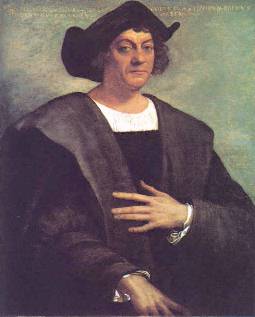Man and Myth
After five centuries, Columbus remains a mysterious and controversial figure who has been variously described as one of the greatest mariners in history, a visionary genius, a mystic, a national hero, a failed administrator, a naive entrepreneur, and a ruthless and greedy imperialist.
Columbus's enterprise to find a westward route to Asia grew out of the practical experience of a long and varied maritime career, as well as out of his considerable reading in geographical and theological literature. He settled for a time in Portugal, where he tried unsuccessfully to enlist support for his project, before moving to Spain. After many difficulties, through a combination of good luck and persuasiveness, he gained the support of the Catholic monarchs, Isabel and Fernando.
The widely published report of his voyage of 1492 made Columbus famous throughout Europe and secured for him the title of Admiral of the Ocean Sea and further royal patronage. Columbus, who never abandoned the belief that he had reached Asia, led three more expeditions to the Caribbean. But intrigue and his own administrative failings brought disappointment and political obscurity to his final years.
When the Taino Indians saved Christopher Columbus from certain death on the fateful morning of October 12, 1492, a glorious opportunity presented itself for the cultures of both Europe and the Americas to flourish.
What occurred was neither glorious nor heroic. Just as Columbus could not, and did not, "discover" a hemisphere already inhabited by nearly 100 million people, his arrival cannot, and will not, be recognized by indigenous peoples as a heroic and festive event.
From a Native perspective, Columbus' arrival was a disaster from the beginning. Although his own diaries reveal that he was greeted by the Tainos with the most generous hospitality he had ever known, he immediately began the enslavement and slaughter of the Indian peoples of the Caribbean.

|

